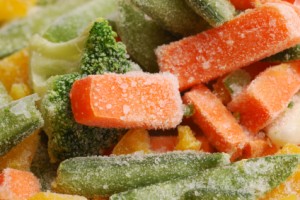 Last week we started busting food myths, which included whether eggs spike your cholesterol and what alcoholic drinks have health benefits. This week we finish the series with a focus on produce and caffeine. If you have any other food myths that you would like busted, let us know and we will bring you the facts!
Last week we started busting food myths, which included whether eggs spike your cholesterol and what alcoholic drinks have health benefits. This week we finish the series with a focus on produce and caffeine. If you have any other food myths that you would like busted, let us know and we will bring you the facts!
Myth: Fresh vegetables and fruits are more nutritious than frozen ones.
Fact: The truth of the matter is that not everyone has access to a farmers’ market where produce can be purchased very soon after it has been pulled from the ground. With that said, the produce you are buying in your grocery story is very likely older than you think.
Once it has been harvested, it can take several days to sort, package and ship these food items across the country to your grocery store. This can, in turn, yield fruits and vegetables that are not as high in nutrient levels such as vitamin C as the ones you purchase at a farmers’ market.
A downside to frozen vegetables is manufacturers sometimes add salt, sugar or fat to an otherwise healthy product. The consistency can also be altered through the freezing process. To ensure you purchase the best frozen product, always check the package to make sure there is no clumping and the product is moving around freely.
In the end, getting produce in your diet is essential to your overall health and well-being. Don’t shy away from frozen varieties if that helps your family with access and convenience.
Myth: Cooking vegetables destroys their vitamin content.
Fact: Cooking vegetables can actually help your body’s ability to absorb the nutrients. One prime example of this is cooked tomato sauce. While eating a raw tomato is certainly good for you, there is more lycopene in cooked tomato sauce. Lycopene helps guard against aging and may help prevent osteoporosis. Keep in mind many nutrients can be lost with the wrong cooking technique. For example, you need to make sure not to over boil your vegetables. For highest nutrient retention in your vegetables, try steaming, roasting, or even the microwave.
Myth: Decaf coffee has no caffeine.
Fact: Through research on a variety of decaf coffee brands it was found that decaf coffee contains roughly 8 to 32 milligrams of caffeine, depending on the cup size. Decaf does have significantly less than a typical 8-ounce cup of coffee, which has between 100 and 150 milligrams of caffeine. For those of you who may be sensitive to caffeine, caffeine-free tea is recommended as a warm drink alternative.
